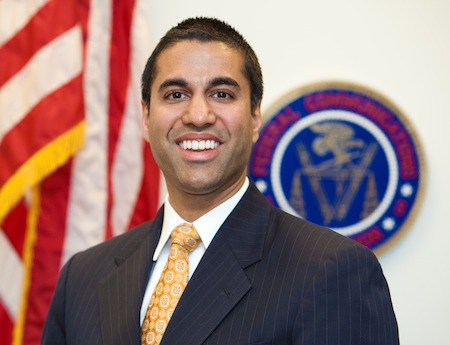Ajit Pai Slams AT&T Fine

The smarter way to stay on top of broadcasting and cable industry. Sign up below
You are now subscribed
Your newsletter sign-up was successful
FCC commissioners Ajit Pai and Michael O'Rielly strongly dissented from the FCC's decision to fine AT&T $100 million for what it said was failing to sufficiently warn customers it would slow broadband speeds, and how much it would slow them, for the highest-volume users grandfathered into its since-ended unlimited data plans.
AT&T said it did inform them and is fighting the fine, which is tied to the network management transparency rule, the only one of the FCC's 2010 Open Internet order rules not thrown out by a federal court.
Commissioner Ajit Pai's dissent was scathing. He called it "a government 'rule' suddenly revised, yet retroactive. Inconvenient facts ignored. A business practice sanctioned after years of implied approval. A penalty conjured from the executioner’s imagination."
FCC chairman Tom Wheeler has long argued that slowing speeds for "unlimited" plan customers was not delivering on both the promise of broadband and the promise of broadband suppliers in labeling it unlimited. But AT&T said it has made clear its policy of slowing speeds for what some have labeled bandwidth hogs as a way to insure service is not degraded for others.
Wheeler has also made it clear that fast broadband for all is a government imperative.
Pai points to AT&T's disclosures in labeling the FCC decision Kafkaesque.
"Because the Commission simply ignores many of the disclosures AT&T made; because it refuses to grapple with the few disclosures it does acknowledge; because it essentially rewrites the transparency rule ex post by imposing specific requirements found nowhere in the 2010 Net Neutrality Order; because it disregards specific language in that order and related precedents that condone AT&T’s conduct; because the penalty assessed is drawn out of thin air; in short, because the justice dispensed here condemns a private actor not only in innocence but also in ignorance, I dissent."
The smarter way to stay on top of broadcasting and cable industry. Sign up below
O'Rielly was less stringent in his objection, calling the violation "tenuous at best." But he had plenty of issues with the decision. He also had trouble with the way the FCC handled the issue. "If the Enforcement Bureau thought there were deficiencies in some of AT&T’s disclosures, it should have taken steps to rectify any concerns prior to imposing a Draconian $100 million penalty and compliance measures," he said.
Contributing editor John Eggerton has been an editor and/or writer on media regulation, legislation and policy for over four decades, including covering the FCC, FTC, Congress, the major media trade associations, and the federal courts. In addition to Multichannel News and Broadcasting + Cable, his work has appeared in Radio World, TV Technology, TV Fax, This Week in Consumer Electronics, Variety and the Encyclopedia Britannica.

